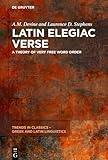Latin Elegiac Verse : A Theory of Very Free Word Order / A.M. Devine, Laurence D. Stephens.
Material type: TextSeries: Trends in Classics – Greek and Latin Linguistics ; 3Publisher: Berlin ; Boston : De Gruyter, [2024]Copyright date: 2024Description: 1 online resource (IX, 320 p.)Content type:
TextSeries: Trends in Classics – Greek and Latin Linguistics ; 3Publisher: Berlin ; Boston : De Gruyter, [2024]Copyright date: 2024Description: 1 online resource (IX, 320 p.)Content type: - 9783111385914
- 9783111386102
- 9783111386065
- 874.009 23/eng/20240605
- PA6059.E6 D48 2024
- online - DeGruyter
- Issued also in print.
| Item type | Current library | Call number | URL | Status | Notes | Barcode | |
|---|---|---|---|---|---|---|---|
 eBook
eBook
|
Biblioteca "Angelicum" Pont. Univ. S.Tommaso d'Aquino Nuvola online | online - DeGruyter (Browse shelf(Opens below)) | Online access | Not for loan (Accesso limitato) | Accesso per gli utenti autorizzati / Access for authorized users | (dgr)9783111386065 |
Browsing Biblioteca "Angelicum" Pont. Univ. S.Tommaso d'Aquino shelves, Shelving location: Nuvola online Close shelf browser (Hides shelf browser)
Frontmatter -- Preface -- Contents -- Abbreviations -- Introduction -- 1 Nouns -- 2 Verbs -- 3 Adjectives -- 4 Coordination -- 5 Relatives -- 6 Varia -- Bibliography -- Index
restricted access online access with authorization star
http://purl.org/coar/access_right/c_16ec
A striking feature of Latin elegiac verse is its very free word order. One gets the impression that the word order is just random or that the rules of Latin syntax have been suspended for metrical convenience. Combining ample philological documentation with an overall theoretical stance, this book argues that these impressions are wrong and proceeds to analyze the syntax of Latin verse as a coherent system generated by the application of a small set of derivational rules. While these rules are independently available syntactic mechanisms like scrambling, stranding and verb raising, their systematically regular application both at the clausal and at the phrasal level is remarkable. Not only complete constituents but also partial constituents are constantly attracted towards the left edge of the phrase that contains them. The cumulative effect of this is to narrow the extent and attenuate the weight of the nuclear assertion, which reduces its processing domain and the span of its prosodic correlate. This book will be of interest both to Classicists and to linguists: it aims to solve an old problem in Classical philology, while at the same time working out a configurational syntax for a language with extreme free word order.
Issued also in print.
Mode of access: Internet via World Wide Web.
In English.
Description based on online resource; title from PDF title page (publisher's Web site, viewed 20. Nov 2024)









